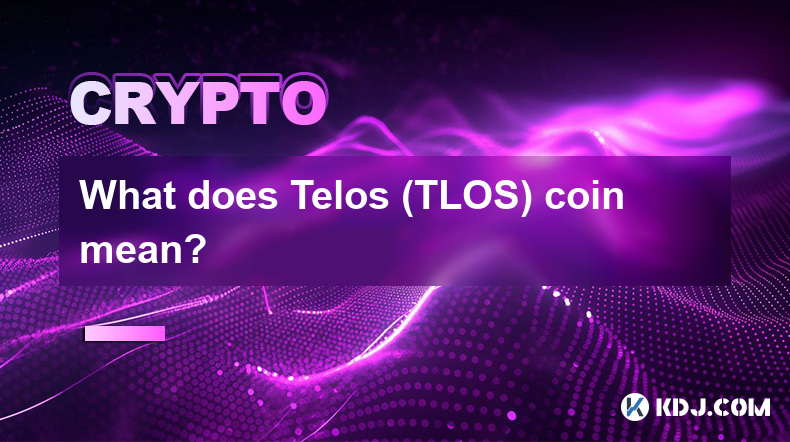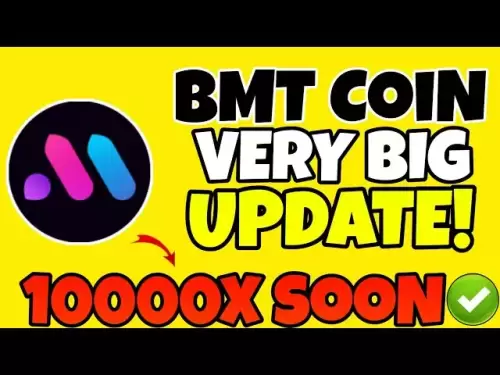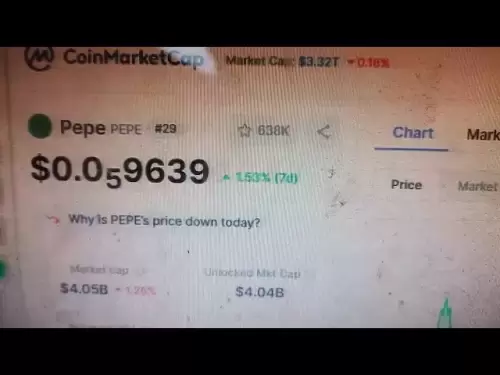-
 Bitcoin
Bitcoin $108,942.7945
0.84% -
 Ethereum
Ethereum $2,550.7975
1.99% -
 Tether USDt
Tether USDt $1.0003
-0.01% -
 XRP
XRP $2.2677
2.56% -
 BNB
BNB $663.1560
1.60% -
 Solana
Solana $152.7411
4.14% -
 USDC
USDC $1.0000
0.01% -
 TRON
TRON $0.2850
0.53% -
 Dogecoin
Dogecoin $0.1708
4.85% -
 Cardano
Cardano $0.5859
2.07% -
 Hyperliquid
Hyperliquid $39.5171
1.44% -
 Sui
Sui $2.9185
1.44% -
 Bitcoin Cash
Bitcoin Cash $496.1863
2.78% -
 Chainlink
Chainlink $13.4483
2.80% -
 UNUS SED LEO
UNUS SED LEO $9.0293
0.06% -
 Avalanche
Avalanche $18.2223
2.50% -
 Stellar
Stellar $0.2448
3.59% -
 Toncoin
Toncoin $2.9214
6.33% -
 Shiba Inu
Shiba Inu $0.0...01181
3.34% -
 Hedera
Hedera $0.1581
2.45% -
 Litecoin
Litecoin $87.8205
1.67% -
 Monero
Monero $318.3990
1.63% -
 Polkadot
Polkadot $3.3992
2.04% -
 Dai
Dai $0.9999
0.00% -
 Ethena USDe
Ethena USDe $1.0001
-0.02% -
 Bitget Token
Bitget Token $4.4137
0.72% -
 Uniswap
Uniswap $7.4148
7.24% -
 Pepe
Pepe $0.0...01002
3.94% -
 Aave
Aave $276.7555
3.24% -
 Pi
Pi $0.4612
0.27%
What does Telos (TLOS) coin mean?
Telos EVM, a layer-2 scaling solution for Ethereum, enhances scalability by processing transactions off-chain to reduce gas fees and transaction times.
Dec 20, 2024 at 04:31 am

Key Points:
- Telos EVM is a layer-2 scaling solution for the Ethereum Virtual Machine (EVM).
- Telos Network is a blockchain platform that hosts a variety of decentralized applications (dApps).
- The TLOS token serves as the native cryptocurrency for both platforms, enabling various transactions and governance functions.
Telos EVM: Layer-2 Scaling Solution for Ethereum
- Telos EVM provides an additional layer of scalability to the Ethereum network by processing transactions off-chain.
- Transactions are executed on the Telos blockchain and then submitted to the Ethereum mainnet for settlement.
- This process significantly reduces gas fees and transaction times compared to performing operations directly on Ethereum.
- Telos EVM is compatible with the Ethereum Virtual Machine, enabling developers to deploy and execute Solidity smart contracts seamlessly.
Telos Network: Blockchain Platform for dApps
- Telos Network is a self-governed blockchain that offers a robust infrastructure for building and hosting decentralized applications.
- The platform employs a federated consensus mechanism known as Delegated Proof-of-Stake (DPoS), where TLOS holders vote for elected block producers to validate transactions.
- Telos Network provides dApps with enhanced performance, security, and scalability through its tailored features, such as resource allocation and smart contract optimization.
TLOS Token: Native Cryptocurrency of Telos Ecosystem
- TLOS is the native cryptocurrency of both Telos EVM and Telos Network.
- It serves as the medium of exchange for conducting transactions within the ecosystem, including gas fees, dApp fees, and governance-related actions.
- TLOS holders have the power to vote for network upgrades, feature proposals, and resource allocations within the Telos ecosystem.
- The token's utility and governance rights contribute to its intrinsic value and drive market demand.
FAQs:
What is the difference between Telos EVM and Telos Network?
Telos EVM is a layer-2 scaling solution that operates on top of the Ethereum network, while Telos Network is an independent blockchain that hosts decentralized applications. Both platforms utilize the TLOS token as their native cryptocurrency.
What are the benefits of using Telos EVM?
Telos EVM offers reduced gas fees, faster transaction speeds, and increased scalability for Ethereum-based applications. It leverages the security and decentralization of Ethereum while addressing its performance limitations.
How does Telos Network enhance dApp performance?
Telos Network provides resource allocation mechanisms, smart contract optimization tools, and a federated consensus algorithm to improve the efficiency, security, and performance of decentralized applications built on its platform.
What is the role of TLOS in the Telos ecosystem?
TLOS is the native cryptocurrency of both Telos EVM and Telos Network, enabling transactions, gas fee payments, and network governance. TLOS holders can vote for network upgrades, feature proposals, and resource allocations to actively shape the ecosystem's evolution.
What are the potential challenges facing Telos EVM and Telos Network?
One potential challenge is competition from other scaling solutions and blockchain platforms vying for market share. Another consideration is the need to maintain a strong community and developer ecosystem to drive adoption and sustained growth.
Disclaimer:info@kdj.com
The information provided is not trading advice. kdj.com does not assume any responsibility for any investments made based on the information provided in this article. Cryptocurrencies are highly volatile and it is highly recommended that you invest with caution after thorough research!
If you believe that the content used on this website infringes your copyright, please contact us immediately (info@kdj.com) and we will delete it promptly.
- Litecoin Breakout Watch: What Traders Need to Know Now
- 2025-07-06 16:50:13
- Bitcoin, Solana, Ethereum: Decoding the Latest Buzz on the Blockchain
- 2025-07-06 16:50:13
- Widnes Resident's 50p Could Be Your Ticket to Easy Street: Rare Coin Mania!
- 2025-07-06 16:55:13
- Bitcoin, Solaris Presale, and Token Rewards: What's the Buzz?
- 2025-07-06 16:55:13
- Ethereum Under Pressure: Price Drop Amid Global Uncertainties
- 2025-07-06 17:00:13
- XRP, SEC Case, and Prosperity: A New Era for XRP Holders?
- 2025-07-06 17:10:13
Related knowledge

How to customize USDT TRC20 mining fees? Flexible adjustment tutorial
Jun 13,2025 at 01:42am
Understanding USDT TRC20 Mining FeesMining fees on the TRON (TRC20) network are essential for processing transactions. Unlike Bitcoin or Ethereum, where miners directly validate transactions, TRON uses a delegated proof-of-stake (DPoS) mechanism. However, users still need to pay bandwidth and energy fees, which are collectively referred to as 'mining fe...

USDT TRC20 transaction is stuck? Solution summary
Jun 14,2025 at 11:15pm
Understanding USDT TRC20 TransactionsWhen users mention that a USDT TRC20 transaction is stuck, they typically refer to a situation where the transfer of Tether (USDT) on the TRON blockchain has not been confirmed for an extended period. This issue may arise due to various reasons such as network congestion, insufficient transaction fees, or wallet-rela...

How to cancel USDT TRC20 unconfirmed transactions? Operation guide
Jun 13,2025 at 11:01pm
Understanding USDT TRC20 Unconfirmed TransactionsWhen dealing with USDT TRC20 transactions, it’s crucial to understand what an unconfirmed transaction means. An unconfirmed transaction is one that has been broadcasted to the blockchain network but hasn’t yet been included in a block. This typically occurs due to low transaction fees or network congestio...

How to check USDT TRC20 balance? Introduction to multiple query methods
Jun 21,2025 at 02:42am
Understanding USDT TRC20 and Its ImportanceUSDT (Tether) is one of the most widely used stablecoins in the cryptocurrency market. It exists on multiple blockchain networks, including TRC20, which operates on the Tron (TRX) network. Checking your USDT TRC20 balance accurately is crucial for users who hold or transact with this asset. Whether you're sendi...

What to do if USDT TRC20 transfers are congested? Speed up trading skills
Jun 13,2025 at 09:56am
Understanding USDT TRC20 Transfer CongestionWhen transferring USDT TRC20, users may occasionally experience delays or congestion. This typically occurs due to network overload on the TRON blockchain, which hosts the TRC20 version of Tether. Unlike the ERC20 variant (which runs on Ethereum), TRC20 transactions are generally faster and cheaper, but during...

The relationship between USDT TRC20 and TRON chain: technical background analysis
Jun 12,2025 at 01:28pm
What is USDT TRC20?USDT TRC20 refers to the Tether (USDT) token issued on the TRON blockchain using the TRC-20 standard. Unlike the more commonly known ERC-20 version of USDT (which runs on Ethereum), the TRC-20 variant leverages the TRON network's infrastructure for faster and cheaper transactions. The emergence of this version came as part of Tether’s...

How to customize USDT TRC20 mining fees? Flexible adjustment tutorial
Jun 13,2025 at 01:42am
Understanding USDT TRC20 Mining FeesMining fees on the TRON (TRC20) network are essential for processing transactions. Unlike Bitcoin or Ethereum, where miners directly validate transactions, TRON uses a delegated proof-of-stake (DPoS) mechanism. However, users still need to pay bandwidth and energy fees, which are collectively referred to as 'mining fe...

USDT TRC20 transaction is stuck? Solution summary
Jun 14,2025 at 11:15pm
Understanding USDT TRC20 TransactionsWhen users mention that a USDT TRC20 transaction is stuck, they typically refer to a situation where the transfer of Tether (USDT) on the TRON blockchain has not been confirmed for an extended period. This issue may arise due to various reasons such as network congestion, insufficient transaction fees, or wallet-rela...

How to cancel USDT TRC20 unconfirmed transactions? Operation guide
Jun 13,2025 at 11:01pm
Understanding USDT TRC20 Unconfirmed TransactionsWhen dealing with USDT TRC20 transactions, it’s crucial to understand what an unconfirmed transaction means. An unconfirmed transaction is one that has been broadcasted to the blockchain network but hasn’t yet been included in a block. This typically occurs due to low transaction fees or network congestio...

How to check USDT TRC20 balance? Introduction to multiple query methods
Jun 21,2025 at 02:42am
Understanding USDT TRC20 and Its ImportanceUSDT (Tether) is one of the most widely used stablecoins in the cryptocurrency market. It exists on multiple blockchain networks, including TRC20, which operates on the Tron (TRX) network. Checking your USDT TRC20 balance accurately is crucial for users who hold or transact with this asset. Whether you're sendi...

What to do if USDT TRC20 transfers are congested? Speed up trading skills
Jun 13,2025 at 09:56am
Understanding USDT TRC20 Transfer CongestionWhen transferring USDT TRC20, users may occasionally experience delays or congestion. This typically occurs due to network overload on the TRON blockchain, which hosts the TRC20 version of Tether. Unlike the ERC20 variant (which runs on Ethereum), TRC20 transactions are generally faster and cheaper, but during...

The relationship between USDT TRC20 and TRON chain: technical background analysis
Jun 12,2025 at 01:28pm
What is USDT TRC20?USDT TRC20 refers to the Tether (USDT) token issued on the TRON blockchain using the TRC-20 standard. Unlike the more commonly known ERC-20 version of USDT (which runs on Ethereum), the TRC-20 variant leverages the TRON network's infrastructure for faster and cheaper transactions. The emergence of this version came as part of Tether’s...
See all articles

























































































